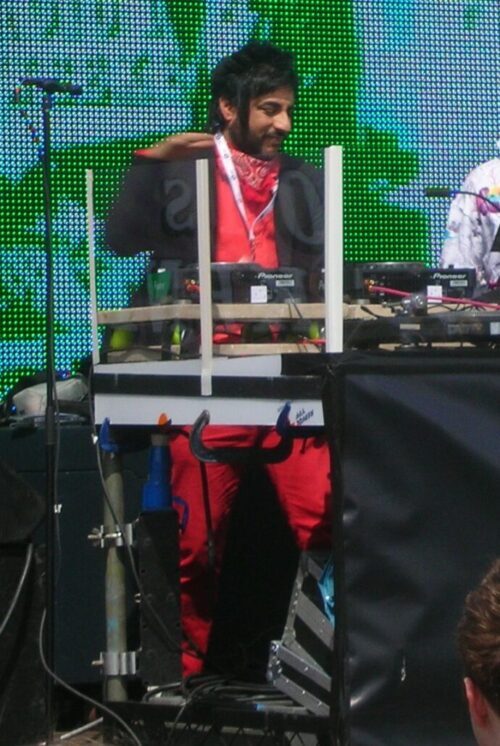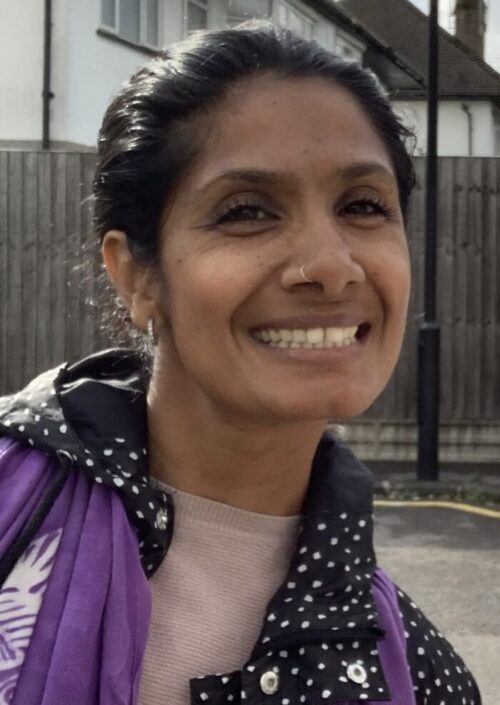South Asian Heritage Month celebrates 5 years of sharing heartfelt interpersonal stories of history and heritage, education, arts, and culture. This year’s theme ‘Free To Be Me’ is meant to reflect on the individual and shared experiences of British South Asians. Stories of struggles and hardships but also of acceptance and individuality.
Such colourful celebration wouldn’t have been possible without the generous patrons of the trust. Starting with Anita Rani, the founding patron whose immense support has helped the trust flourish.
However, Rani isn’t the only famous British South Asian flying the flag for SAHM – let us introduce the other patrons that are championing inclusion.
Bobby Seagull
Don’t be confused by the unusual surname, Bobby Seagull is in fact his actual name. Though, he does share Jay as a first name with his brothers, which stems from an old South Asian tradition. Inspired by the book Jonathan Livingston Seagull by Richard Bach, Bobby’s father named his son after the protagonist of the story. The book explores the journey of the underdog’s success against all odds. This tremendous love his father had for literature led to Bobby’s public library advocacy later on.
Indeed, despite adversities, Bobby Seagull grew up to be an investment banker, a popular math teacher, a TV broadcaster, and a writer. Quite the unique career path. But what put him under the spotlight was becoming captain of the Emmanuel College University Challenge team after getting a sixth form scholarship to Eton.
His biggest passion in life stems from his firm belief in the value of education. As a mathematician he has embarked on the journey to improve math literacy by teaching math through music. Bobby has become a popular teacher among his students by becoming the Jamie Oliver of math. He shared that “Jamie Oliver helped introduce healthy food in schools. I would love to be the equivalent for mathematics where I can help change how people nationally think about it.”
 Argos, CC BY 3.0 , via Wikimedia Commons
Argos, CC BY 3.0 , via Wikimedia Commons
Bobby Friction
Coincidentally, the second Bobby on our South Asian Heritage patrons list has also chosen music (with less math) to showcase his passion and career choice. Far more than just a DJ and a presenter, Bobby Friction has dedicated his platform to promote South Asian music from all over the world. Alongside his DJ career, in 2018 he produced the documentary Straight Outta Mumbai, exploring the history of Indian Hip-Hop.
For his efforts in spreading South Asian music and culture, Bobby Friction took the Specialist Music Category award in the 2003 Sony Radio Academy Awards. And Best Radio Show during the Asian Media Awards in 2016 for Fiction. The show where he showcased new music from British Asian and South Asian artists. After all, he isn’t known as the Desi Beats expert for nothing.
 MGSpiller, CC BY-SA 3.0 , via Wikimedia Commons
MGSpiller, CC BY-SA 3.0 , via Wikimedia Commons
Nikesh Shukla
Times proclaimed him a Cultural Leader. Foreign Policy listed him as one of the 100 Global Thinkers. The Bookseller declared him one of the Most Influential People in Publishing for both 2016 and 2017. Costa First Novel Awards shortlisted his debut novel Coconut Unlimited.
On the surface, Coconut Unlimited appears to be a story about the adventures of three hip-hop obsessed Asian boys in a private high school. But when you take a deeper look, the novel reveals snippets and snapshots of the second generation British Asian childhood experiences. With a bittersweet accent, the story focuses on Amit who struggles to define himself in the two cultures he was born in. While wholly succumbing to a third one – hip-hop.
Nikesh Shukla isn’t your ordinary novelist and screenwriter. He isn’t just a patron for the South Asian Heritage Month. Many would call him insane, I would rather use the word brave. After all, not everyone has the guts to turn down an MBE.
As part of the Queen’s birthday honours in 2021, Nikesh Shukla was presented with The Most Excellent Order of the British Empire for services to literature. An award many would associate with honour and prestige. For Shukla, however, history and commemoration meant much more. He publicly rejected the MBE with the words “I don’t want an honour glorifying the British Empire”. And who can blame him? Decades of racism and colonialism can’t be erased with a mere award. Regardless of how noteworthy it might be.
Dr Amir Khan
The NHS doctor turned TV GP, Amir Khan, is the fourth patron of the South Asian Heritage Month. His mother had a huge influence in his decision to become a doctor and had been a great inspiration for a lot of South Asian women. Due to her keen advocacy in women getting mammograms and actively trying to abolish the taboos surrounding the topic in the community.
Not just a good doctor, but also a good mentor. Khan is credited with GP Trainer of the Year by the Royal College of General Practitioners in 2018. For making sure that the next generation GPs will be as qualified and prepared for the hardships of the job as their predecessors. To top it off, Dr Amir Khan is also a keen enthusiast of wildlife and nature conservation and promotes the link between nature and health.
Despite his busy schedule as a partner in one of the UK’s busiest surgeries, Amir Khan had found free time to become a renowned TV personality. He participated in The Doctor Will See You Now (2020) program, which aim was to tell stories about sickness and health. From community care to blood and bones, Dr Amir Khan has seen it all. If you’re squeamish, the program might not be your cup of tea. But if you’re ready to witness the hardships of the profession ‘doctor’ and bask in the aftermath of a job well done, then by all means enjoy the show.
Babita Sharma
Babita Sharma is another member of the South Asian Heritage Month who has proven herself an exceptional writer. She won the Asian Achievement Award for contributions in Media, Arts and Culture for her best-selling book The Corner Shop (2019)
As a successful BBC newsreader and a broadcaster, it comes to no one’s surprise that her book tackles the historical and sociopolitical aspects of the lives of South Asian immigrants in the UK. It is a memoir of a kind where Sharma recounts her father’s experiences moving in Britain. And recalls her childhood and youth years living above corner shops owned by her parents.
She draws an important timeline of the changes Britain goes through the decades. And how it has affected small businesses, usually owned by immigrants from India, Eastern Europe, and South Africa. From the power cuts in 1970’s to the rise of the supermarkets and the very recent revival of corner shops. Which Sharma explains is partially due to Covid. This small memoir has carefully crafted a bittersweet side of immigration we don’t often see in the news.
As well as highlighting the struggles of south Asian immigration, Sharma is also tackling climate change and currently presents a pod cast titled ‘Mum, will the planet die before I do?’ exploring our roles as parents in tackling the climate crisis.
 The British Library, CC BY 3.0 , via Wikimedia Commons
The British Library, CC BY 3.0 , via Wikimedia Commons
Dr Ranj Singh
Dr Ranj Singh is a face many are deeply familiar with. From a presenter on Save Money, Good Health to a main actor on Dr Ranj On Call. Contestant on BBC Strictly Come Dancing in 2018 and the star of Garrick Theatre in London in the musical West End show Scrubs To Sparkles. Singh has become a nationwide recognizable TV personal and a public figure.
But his talents don’t stop on the screen and stage. As a child genius who claimed his first GCSE at just the age of eight years old, Singh is currently a practicing NHS Consultant Emergency Paediatrician. His mission for his medical careers is to help children and young people with their suffering health. In 2015 he released a passion project on Cbeebies titled Get Well Soon Hospital expanding on his work in paediatrics to a wider audience. As an education advocate in paediatrics, Singh has also shown his support in LGBTQ+ education, as he is a part of the community himself.
Balvinder Sopal
Anatomy of Crime (2005), White Girl (2008), Waterloo Doctor (2010), Coronation Street (2013, 2017) and many more. You’ve seen them, you know them. But did you also know that Balinder Sopar has acted in all of them? Though she is mostly known for her performance in EastEnders (2020-[present) as the villainous Suki Panesar.
But despite being a soap opera queen, Sopal started as a drama kid. After graduating with Honours in Media with Theatre Studies of University of Huddersfield , she began her career in a community theatre. She appeared in The Beautiful Violin, Absent Friends and Relatively Speaking.
Perhaps, her biggest career milestones have always been her community work. Sopal is an Associate Artist in local theatre company Play On Words in Gillingham. And she regularly contributes in the Dominic King Arts and Culture Show for BBC Kent. Through organizing and attending events, participating in workshops, public speaking and creating shows for and with local communities, Balvinder Sopal has aimed at giving back and helping others succeed in the art industries. The same way her community had helped her for her career kick off.
 DarkGlow, CC BY-SA 4.0 , via Wikimedia Commons
DarkGlow, CC BY-SA 4.0 , via Wikimedia Commons
Free To Be Me
As you now know, each of the South Asian Heritage patrons have their own stories to tell. But these aren’t just tales of adversity, and SAHM isn’t a celebration of diversity. The SAHM trust are striving towards what we all seek no matter what our race, or heritage may be… inclusion.
Their mission through education, celebration and commemoration is to promote a cohesive society where their rich culture isn’t lost in translation. But instead, has experienced a natural progression with its integration with British Society. Ultimately making everyone free to be themselves!
To find out how you get involved in the celebrations you can head towards their official site here.
